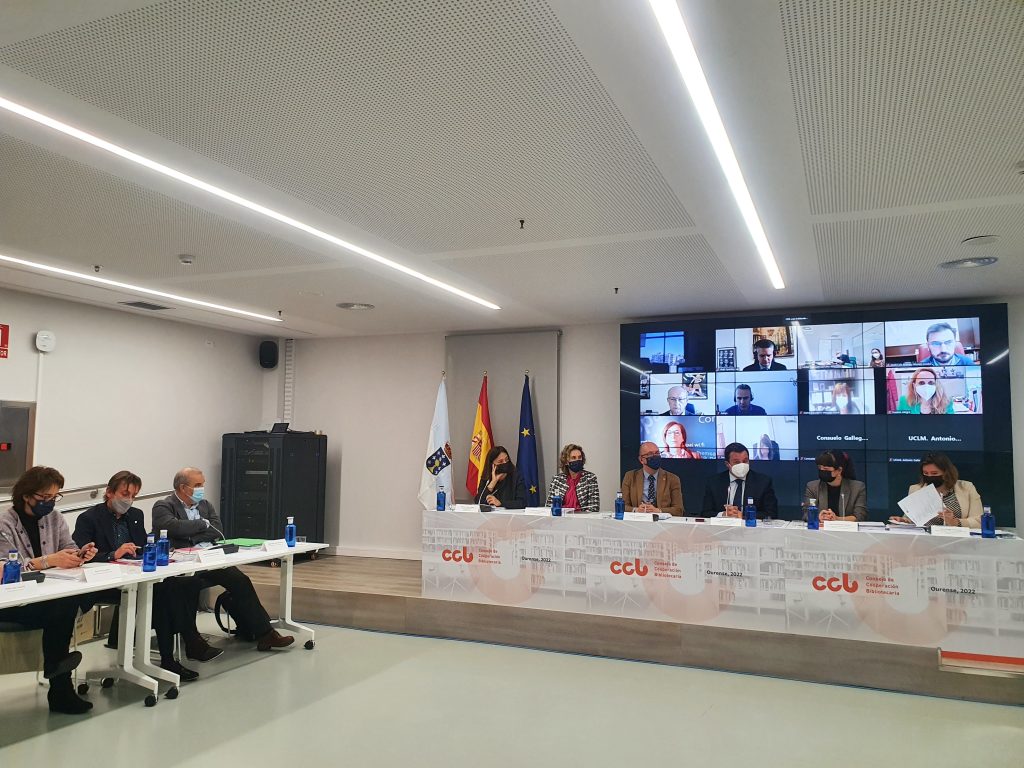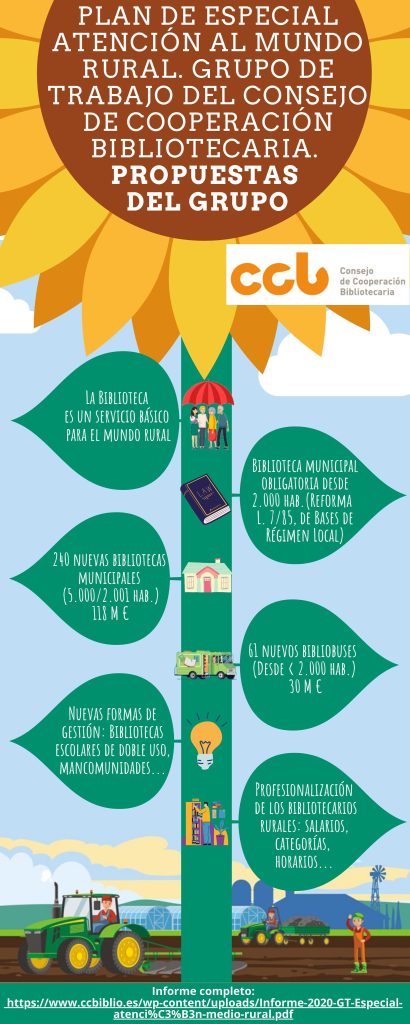As the 3rd Strategic Plan (2019-2023) of Spain’s Library Cooperation Council (Consejo de Cooperación Bibliotecaria, CCB in its Spanish acronym) is stepping into its last year, it is a good time to reflect on the work in progress and the accomplishments already made.
The Library Cooperation Council was created back in March 2008 and it came into being with the aim of creating a framework in which Spanish libraries could work in cooperation.
In this regard, it must be clarified that Spain is one of the most decentralised countries in Europe, with most of the competences related to libraries belonging to its Comunidades Autonómas –the regions, with their own governments and significant political competences- and the municipalities. Accordingly, the regions have elaborated throughout the years their own library systems and library laws.
The Spanish Law for Reading, Books and Libraries, dated June 2007, provided for the creation of the Consejo de Cooperación Bibliotecaria, as the body that channels library cooperation between public administrations. It is a collegiate body of inter-administrative composition, dependent on the Ministry of Culture and Sports. As mentioned before, it started working in 2008 and is regulated by the Royal Decree 1573/2007. The Decree states the following functions for the CCB:
- To promote the integration of publicly owned library systems into the Spanish Library System.
- To prepare specific plans to favor and promote the development and improvement of the conditions of libraries and their services.
- To promote and foster exchange and professional training in the library field.
- To mandatorily report the legal and regulatory provisions that affect Spanish libraries as a whole.
- To propose the implementation of projects.
- The preparation, study, and development of all kinds of actions related to libraries entrusted to it by the sectorial conferences on Culture and Education and the Conference of Rectors of Spanish Universities.
All types of libraries are represented, and each has their own committee: National and Regional Libraries, Academic Libraries, School Libraries, Special Libraries and Public Libraries.
In the years following the establishment of its different bodies, the need for Strategic Plans was clear and the task to elaborate on the first started, resulting in the approval of the first Strategic Plan 2013-2015. Subsequently, the Plenary of the Library Cooperation Council approved the second Strategic Plan 2016-2018 at its meeting in March 2016. Highlights include, among others, the development of eBiblio, the Spanish e-book lending platform, run in cooperation between the Ministry and the regions, and the Report on Socioeconomic Impact of Libraries in Navarre.
After these two experiences, the need arose for strategic plans to have a longer time span since there were a number of possibilities that could be undertaken under the different objectives and two years proved to be a very short period of time to be able to carry them out. Therefore, it was agreed to take on the task of producing a third Plan with a 5-year span. During 2018, work was carried out on the preparation of the third Strategic Plan 2019-2023, its transversal axis being gender equality, reflected in the different lines of action established.

The result, the creation of which involved nearly 200 library professionals at its different stages, with work being carried out throughout 2018, was a plan with 5 very different lines of action:
1. Users, users, audiences and audiences
Encouraging Participation and Citizens with a Critical Capacity
Identifying New Audiences/Non-users
2. Professionals and teams
Defining Recommendations for a Map of Libraries
Promoting the Suitability of Professional Profiles
Developing an Ongoing Training Plan
3. The Visibility of Libraries
Communicating the Value of Libraries
Cooperation with Other Sectors
4. Digital Citizens
Preserving and Disseminating Bibliographic Heritage
Driving Open Access
5. Library Cooperation Council Operations
Improving the Running of the Council and its Bodies
Enhancing CCB’s Sphere of Influence
Establishing Spaces of Cooperation
Let us go through some of the actions that have taken place in the last few years.
Since Gender Equality is at the basis of the Plan, the first step was to establish an Advisory Committee on Gender Equality and Libraries. Under this umbrella, two different committees have been working on a number of issues. A map of women authors in Spain is under construction, as well as the Guidelines to Include Gender Perspective in Libraries Work.
The Library Labs project (see the former post on this blog Library Labs: a project from Library Coordination at the Spanish Ministry of Culture and Sports), promoting public participation with the help of libraries, has been given a boost with the creation of the Expert Group that actively participate in the Ministry’s project. In this regard, a Study on Public Participation and libraries is due to be published in the early months of 2023.
Special libraries have been in the spotlight with the elaboration of a Visibility Strategy, which involves, among others, the creation of the Special Libraries Map, released in 2021 and including: nearly a thousand libraries at this moment, a Report on the Situation of Special Libraries in Spain, and its first Special Libraries Conference, held last November 2022 under the theme ¿Invisibles? Imprescindibles (Invisible? Indispensable).
Regarding digitization, The National Digitisation Strategy (translated into English) was approved in 2021, and it was the result of the work of a Strategic Group, created for that end. This National Digitisation Strategy was conceived as an instrument to define the basic guidelines for digitisation, between different administrations and governing bodies, of bibliographic heritage, acting as a framework to later draft Operative Plans developing each of its working lines. The Strategy aims to facilitate coordination on different aspects of digitisation and to promote joint actions and cooperative projects in the field of bibliographic heritage digitisation. It is carried out in accordance with the Commission Recommendation of 2011 on the digitisation and online accessibility of cultural material and digital preservation (2011/711/UE), also highlighting the importance of coordination and cooperation. In Spain, considerable steps have been taken in this line of cooperation through Hispana, a portal to access Spanish digital heritage and a national aggregator of Europeana. The National Digitisation Strategy will be developed from 2022 to 2026.
The main objectives of the Strategy are:
- to improve the collection of data on digitization in Spain – which is the first line of work currently being developed;
- to rationalize the efforts of memory institutions on digitization, online accessibility and the preservation of bibliographic materials through actions and cooperative projects to eliminate duplication;
- to expand the quantity and quality of digital collections;
- to promote the accessibility and reuse of content through its contextualization and positioning on the web, the confluence with the creative industries and the dissemination of clear and simplified information on intellectual property rights and to develop a “National Strategy for the Digitization of Cultural Heritage, following the recommendations of the European Commission, including all sectors of cultural heritage (libraries, archives and museums).
Also in 2021, the Recommendations for Projects of Digitisation of Bibliographic Heritage and Historical Photography were published with the aim of being a reference for any institution willing to embark on a digitisation project. The publication addresses all types of text, printed, graphic and cartographic materials, such as books, newspapers, magazines, maps, drawings and engravings, scores, manuscripts, microfilms, and photographic materials, and all the stages of the process, from initial planning to delivery of digitized materials.
The rural world, with its special factors related to depopulation and an ageing population has specially being taken into account, with a Committee working on different aspects. The current law states the obligation to provide public library services in municipalities with a population of more than 5,000 inhabitants. The Committee has worked on a proposal to modify the criteria to 2,000 inhabitants. This proposal was approved by the Plenary – the highest-ranking body in the CCB composed, among others, of representatives of all the administrations involved in 2021 and presently, the Spanish Federation of Municipalities and Provinces has included it in the proposals that they are presenting to the Government. The Committee is working on the viability of the proposal and the different ways public library services can be provided.

The Libraries for Agenda 2030 Committee has been especially active in the last few years, publishing The Implication of Spanish Libraries in the 2030 Agenda, conceived as an advocacy tool for library professionals to show how libraries actively and in a very important way contribute to different SDGs. In the same way, the Committee is currently updating its National Strategy for Information and Libraries.
The pandemic has undoubtedly hit some of the actions in the plan and left others un-started, but it has also arisen other topics and points of view, which otherwise probably would not been taken into account, that will certainly be addressed in future plans.
Susana Alegre Landaburu is Head of Cooperation at the Libraries Coordination Subdirectorate, in the Spanish Ministry of Culture and Sports


